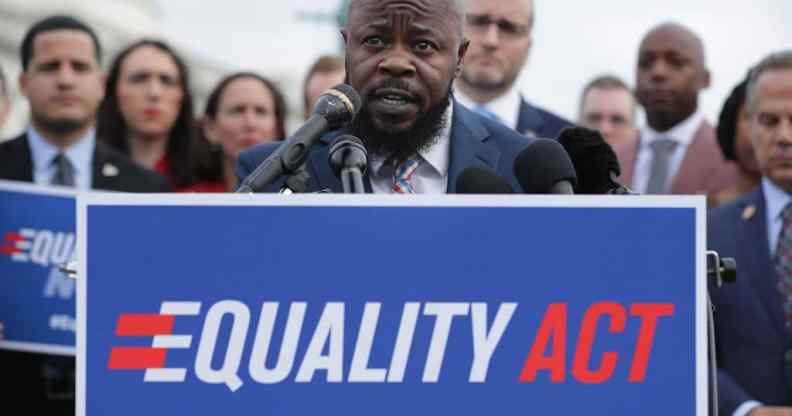Historic Equality Act reintroduced in the US House ahead of decisive vote on the future of LGBT+ rights

Founder of Black Transmen Carter Brown addresses a rally with members of Congress. (Chip Somodevilla/Getty)
The Equality Act has been formally reintroduced to the House of Representatives by gay congressman David Cicilline and senator Jeff Merkley.
The Equality Act would amend the Civil Rights Act of 1964 to prohibit discrimination based on sexual orientation or gender identity in housing, employment, public education, and a number of other areas.
While the Democratic-controlled House of Representatives passed the Equality Act in 2019 by a vote of 236-173, it was never even brought for a vote in the then-Republican controlled Senate.
Now, Democrats are renewing their efforts to get the Equality Act passed following Joe Biden’s promise to make it a priority in his first 100 days.
Cicilline and Merkley announced that the Equality Act had been reintroduced to the House on Thursday (18 February).
“In 2021, every American should be treated with dignity and respect,” Cicilline tweeted.
“After so many years of waiting for full LGBTQ equality, the time as come.”
LGBT+ rights organisations welcome the reintroduction of the Equality Act.
The news was welcomed by Alphonso David, president of the Human Rights Campaign (HRC).
“Achieving LGBTQ equality is a unifying issue for our nation,” he said in a statement.
“Today, the Equality Act was reintroduced in Congress with broad support from a majority of people in this country, hundreds of members of Congress and an unprecedented number of businesses who believe that every person should be treated equally under the law.
“While President Biden’s Executive Order implementing the Supreme Court’s Bostock ruling was a crucial step in addressing discrimination against LGBTQ people, it’s still vital that Congress pass the Equality Act to codify the Bostock decision to ensure protection in key areas of life including where existing civil rights laws do not have protections on the basis of sex.”
The reintroduction of the Equality Act was also welcomed by Kevin Jennings, CEO of Lambda Legal, an LGBT+ legal organisation.
“Lambda Legal applauds the reintroduction of the Equality Act, long past-due federal legislation which provides clear, comprehensive, and explicit protections for LGBTQ people in federal law,” Jennings said.
“Coupled with President Biden’s early action applying the US Supreme Court’s ruling in Bostock v Clayton County to all federal laws currently prohibiting sex discrimination, we can see true equality on the horizon.”
He added: “LGBTQ people across the country remain vulnerable to discrimination on a daily basis and too often have little recourse. Without comprehensive federal protections, the basic rights of LGBTQ people vary state to state.
“In some instances, individuals lose rights and protections the moment they cross the border into a neighbouring state, underscoring that the current patchwork of protections for LGBTQ people is inadequate.”
Jennings said many employers, landlords and lenders have not yet “gotten the message” that anti-LGBT+ discrimination is wrong.
“We need the absolute clarify of the Equality Act, and we need it now.”
The Equality Act is expected to make its way without incident through the House of Representatives, but trouble could be on the horizon when it makes its way to the Senate, where Democrats and Republicans have 50 seats each.
Vice president Kamala Harris has the ability to cast a tie-breaking vote in the Senate if the bill gains exactly 50 votes, but one Democrat, West Virginia’s Joe Manchin, has previously declared his opposition to the bill.
To make matters worse, 60 votes would be needed to override a likely GOP filibuster effort unless Democrats succeed in abolishing the filibuster mechanism – which Manchin and another conservative Democrat, Kyrsten Sinema, have both stated their opposition to supporting.

